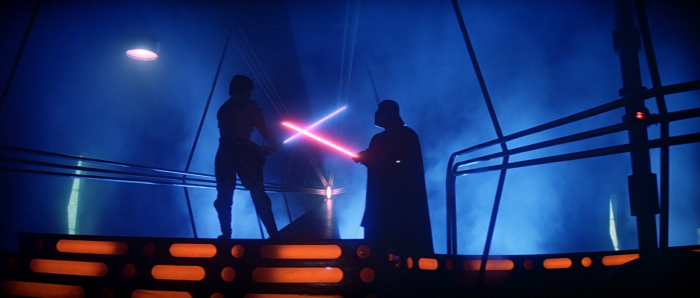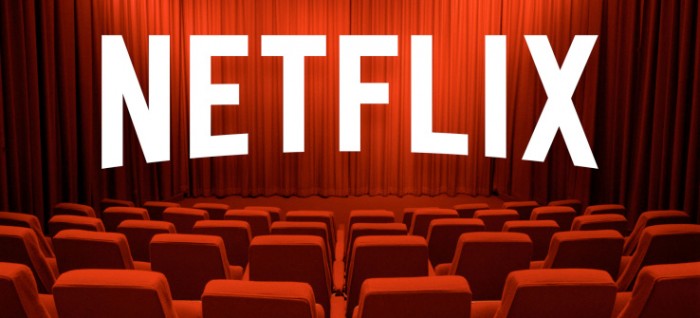Netflix Thinks We Need To Stop Romanticizing The Cinema Experience... And I Kind-Of Agree?!
(Welcome to The Soapbox, the space where we get loud, feisty, and opinionated about something that makes us very happy...or fills us with indescribable rage. In this edition: why Netflix may be kind-of, sort-of right about film fans needing to stop romanticizing movie theaters.)
Watching a movie at home on TV simply isn't the same as going to the movie theater and watching a film on the big screen with an audience. Streaming giant Netflix believes we need to get rid of this romantic notion around the moviegoing experience...and I think I agree. Kind of.
A Sacrilegious Statement?
In a new interview with Deadline, Netflix Chief Content Officer Ted Sarandos explains that as a society we are going to have to lose the "romantic" idea of going to the cineplex to enjoy movies:
A lot of directors will come in and they will talk about the movies that they saw, and these are the movies that influenced them and made them want to be a filmmaker, and in almost every case they watched them at home on a VHS tape. There's a romantic notion about the film being on a big screen. There's definitely something about a [Sundance] premiere at Eccles [theater] that you can't replicate — that I can't replicate — but the fact is, that happens for a couple hundred people once a year. We're doing it every day for the world. People who are discovering a movie that might change their life; that's who they're talking to. We have to get rid of the romantic part. I don't really think that they're mutually exclusive. I think over time that these films will get booked into theaters at the same time they're on Netflix.
When I first saw Sarandos' quote in a headline, I thought "Fuck him." Seriously, can this corporate guy really tell us that we need to lose the romantic notion of the moviegoing experience? As someone who has grown up going to the movie theater every Friday night and watching movies with a packed room of excited moviegoers, I feel like there is no better way to experience a movie.
Of course, many people disagree. In many areas, the cinema-going experience has gone down hill. It's more expensive, not as comfortable as most home theaters, and requires dealing with noisy, inconsiderate audience members who won't put their phones away.
And like many of you, most of my movie and television consumption happens at home. I have a real comfortable set-up, and regularly consume a couple of dozen hours of viewing from my couch on a weekly basis. What if Sarandos is right? What if my love of the movie theater is nostalgia? I still enjoy going to the movie theater and it's my preferred way to watch a film (especially a big blockbuster event film), but some of his points do make sense.
The Spoiler Example
When the topic of movie spoilers come up, I often use one example to prove the point that a spoiler can not ruin a good movie: The Empire Strikes Back. It might be the biggest twist in movie history. Just about every regards Darth Vader telling Luke about his parentage as one of the best movie moments of all time.
Most people I know first watched that film after knowing about Darth Vader's iconic reveal, yet that moment still holds up as one of the best in cinema history. You could say "But it would have been better if you had not known that iconic twist!", but you hold on to it so dearly, even though you knew the details beforehand. Many of you may have even forgotten that you knew beforehand. A spoiler can ruin a surprise, but a surprise is a bit of a gimmick and not much else. A spoiler can't ruin a great story and a great moment. That moment is just as great and emotional if you know the reveal.
So Sarandos' VHS example hits home with me. A good movie is a good movie. Much like how a spoiler can't ruin a great movie, choosing to watching something at home won't necessarily make it less great. Watching a good movie on my home theater can be as as effective as watching it at my multiplex. I still prefer the movie theater experience to the home-watching experience, but I understand that one is not better than the other – they are just different kinds of experiences for different kinds of people and situations. And I have an emotional attachment to one of them.
The Shifting Paradigm
I don't think we'll ever lose the concept of movie theaters. People will always want to see movies on the big screen. And I do think it's a shame that most Netflix Originals aren't available in this arena. Our own Ethan Anderton even ranted about this earlier in the week, saying he would love the ability to watch Netflix originals movies in the theater. In fact, Sarandos also believes the current theatrical model as completely dated:
What I'm trying to do is take the benefits and the beautiful byproduct of the internet, which is all about consumer choice, and apply it to movies where no one else has. The theatrical movie window is the only window that really still exists. Every other form of entertainment is pretty much available to consumers where and when they want it. Perpetuating the movie window — adding new money to perpetuate the old system — I don't think is really that interesting.
Netflix would like to have their movies play day-and-date in theaters alongside their streaming options, but the old theatrical window system is preventing it. They do a few theatrical releases every so often, but I those often happen to fulfill contracts or meet award consideration requirements. These screenings are typically only in New York City and Los Angeles.
I'm sure many of you would love to see Will Smith's upcoming movie Bright on the big screen, but it seems like we may be a few years away from that level of cooperation. Sarandos talks about the consumer choice: how many consumers would choose to see Bright on the big screen if they could just click a button and watch it on Netflix streaming from the comfort of their couch? I really do wonder.


